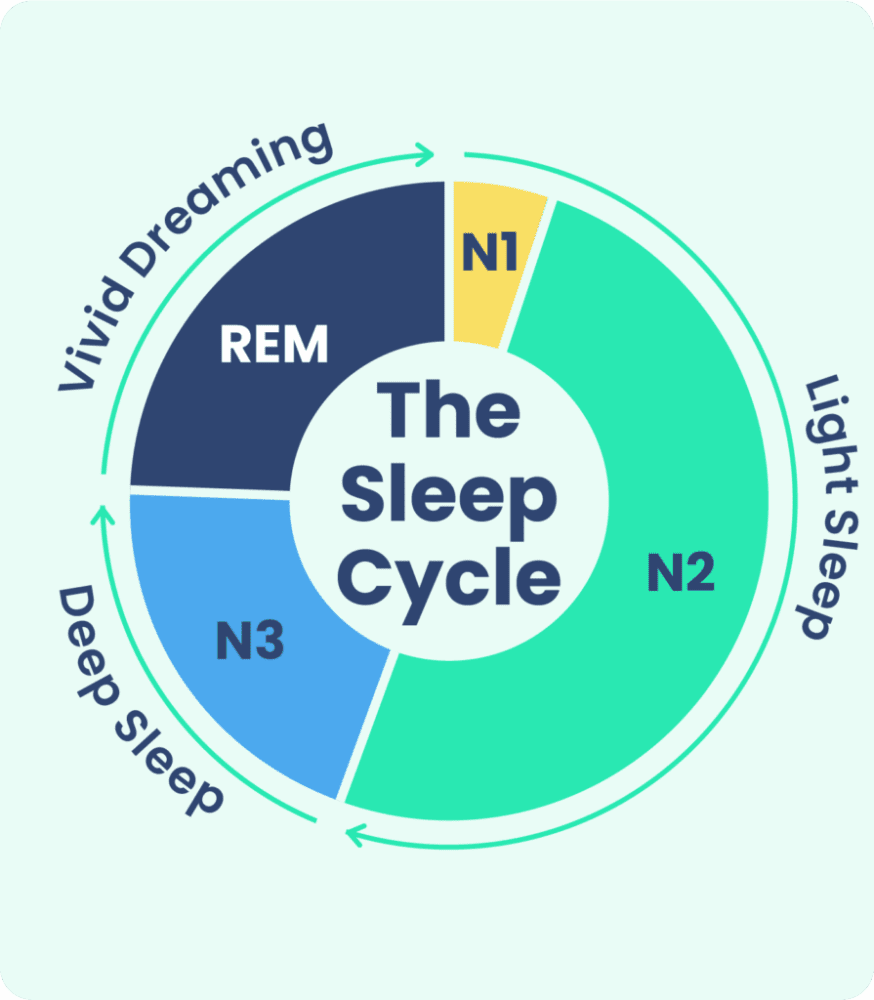
Sleep. We all do it. Well, most of us, most nights—talk to a menopausal lady and you might get a different story… Maybe it would be more accurate to say, ‘Sleep; we’ve all done it at some point.’ And therein lies the problem—some of us find sleeping a hard thing to do at the best of times, certainly not well enough to feel fully rested. Some people are so good at it they can do it with their eyes closed. And tall people—did you know that they sleep longer in bed than short people? Does this have anything to do with woolly mammals and how high you can count? Ok kids, enough of the baaaad jokes; we need to get serious about sleep. Brush your teeth and get your jimjams on because we’re going to try to answer some tough questions about why we do or don’t sleep.

What is sleep?
Sleep is a natural and essential process during which we have decreased responsiveness to external stimuli, altered consciousness, and reduced physical activity, allowing the body and brain to rest and restore. During sleep, the body cycles through different stages of non-rapid eye movement (NREM) and rapid eye movement (REM) sleep.
Here’s the thing: sleep isn’t just “downtime”. Your body and brain are pulling an all-nighter behind the scenes—repairing tissues, sorting memories, balancing hormones, and doing other mysterious maintenance jobs we don’t even have a clue about yet. And when you skimp on it? Let’s just say your brain and body start running like a phone with 2% battery and no charger in sight.
Why do we need sleep?
|
Brain Learning and Filing
|
Sleep supports your brain to consolidate information and form new synaptic pathways—essential for learning, problem-solving, and “filing” away in your brain what happened during the day. |
| Focus and Alertness
|
Getting enough rest supports your attention span, decision-making abilities, and overall alertness. |
| Brain Maintenance
|
The brain performs vital housekeeping functions during sleep—the “glymphatic system” clears out toxins that build up while you’re awake. |
| Immune System
|
Quality sleep supports your immune response, supporting you to get sick less often. |
| Sức khỏe tim mạch
|
Adequate sleep is crucial for supporting a healthy heart and blood vessels. |
| Metabolism and Weight
|
Sleep supports a healthy appetite, metabolism, and blood sugar levels, which supports a healthy weight. |
| Tissue Repair
|
During sleep, the body repairs tissues, stimulates muscle recovery, and releases growth hormone, which is vital for growth and repair. |
| Mood
|
Getting enough sleep supports your mood, and stress and emotional resilience. |
| Behaviour
|
A lack of sleep can lead to problems with impulsivity, emotional outbursts, and difficulty coping with stress and change. |
| Degenerative Illness
|
Chronic sleep deprivation is linked to an increased risk of serious health conditions. |
| Brain Health
|
Research shows that prioritising sleep is a significant investment in future brain health, supporting the functioning of our brains as we age. |
What are the stages of sleep?
Sleep occurs in two main phases, Non-Rapid Eye Movement (NREM) and Rapid Eye Movement (REM), with NREM further divided into three stages (N1, N2, and N3). During a sleep cycle, you progress from light sleep (N1) to deeper sleep (N2 and N3), then enter REM sleep, where dreaming occurs, and then cycle back through NREM stages, repeating this process 4-6 times per night. NREM sleep is vital for body repair and tissue growth, while REM sleep is crucial for learning, memory, and mood regulation.

What factors keep us from getting good sleep?
- Circadian health
The body’s internal biological clock, or circadian rhythm, regulates the cycle of sleep and wakefulness, and our hormonal cycles, and is influenced by factors like light and darkness. Disruptions to circadian health are common in modern life, but it can be brought back into rhythm.
- Alcohol or coffee
Alcohol initially acts as a sedative but ultimately degrades sleep quality and can lead to frequent awakenings. Caffeine is a stimulant that blocks the brain’s sleep-supporting chemicals, making it harder to fall and stay asleep, with its effects lasting for hours.
- Poor diet and snacking late at night
It’s a complex topic—not least because some people need a little healthy snack before bed to provide sustained energy to sleep through the night—but suffice it to say that these can throw off your circadian rhythm (internal clock) and the ratio of cortisol to melatonin production, which can make sound sleep harder to attain. It is best to dial in your diet during the day so that you no longer need any food prior to bed, which will support your rest (and digest) function and sleep quality. Diet quality can also affect our metabolism, hormones, and our organ function, which can seriously impact our sleep quality.
- Artificial light and screens
Another complex topic. Safe sunlight exposure from dawn to dusk, plus limiting artificial light and screens (mostly harsh blue light) at night, are key to our circadian and hormonal rhythms. LED home lighting use has coincided with poorer circadian health—switch back to lower wattage incandescent bulbs or even candlelight, which are very rich in healthy infrared spectrum light and very, very low in blue light.

- Pets in the bedroom
This is a contentious one. Some research says that having a pet to sleep with can improve sleep quality. On the flip side, who hasn’t been consistently woken up at 2am by a meowing cat who wants to play?!
- Snoring
Snoring and pauses in breathing can be a sign of something more serious going on. They can also decrease oxygen intake through the night, which contributes to poor sleep quality.
- Nhấn mạnh
This is something we all know a bit about. Sometimes you just have to get through a stressful period knowing you’ll come out the other end. Stress can affect our mood, hormones, physical health, and, well, everything!
- Lack of energy
It sounds counterintuitive, but sleep takes a lot of energy. Have you ever felt so ‘overtired’ that you can’t sleep? That’s your body saying it doesn’t have enough in reserve to get to sleep and stay asleep.
- Erratic schedule
This harks back to ensuring circadian health. Additionally, some people have shift work, which cannot be helped. But there are circadian tips for shift workers such as controlling light exposure and diet, napping when needed, and maintaining a consistent routine.
- Travel
Changing time zones will do it! Travel is also tiring, which doesn’t help. The good news is that travel is usually short-lived and not a long-term sleep depriver!

What are the 6 tips to support sleep?
- Circadian health encompasses appropriate light exposure, a healthy diet (including limiting coffee and alcohol…), meal timing, and activity levels. It aligns your body’s internal clock with the 24-hour day-night cycle to support hormone function, body temperature, and alertness, leading to better sleep quality and timing. A healthy circadian rhythm supports sustained energy levels for quality sleep and hormonal release of melatonin at night for sleep and cortisol in the morning for alertness.
- Stress release techniques can help you cope with either fleeting or continuous stressful periods in your life. Lean into meditation and breathwork, practice presence/mindfulness, and do more of what you love to bring you joy and happiness. Remember what you truly value, embrace the mysteries of life, and let go of needing certainty.
- Vệ sinh giấc ngủ encompasses factors like maintaining a consistent sleep/wake schedule (e.g., asleep by 9-10pm every night, where possible), optimising your bedroom environment—dark/cool room, no devices, Make the bedroom your sanctuary, wind down before bed, and use the circadian tips regarding light—wake with the sun, limit artificial light, use blue light blocking glasses or circadian bulbs, etc.
- Practice the 10 5 3 2 1 0 rule for sleep—10 hours before sleep = No more caffeine; 5 hours before sleep = No more intense exercise; 3 hours before sleep = No more food or alcohol; 2 hours before sleep = No more work or screen time (shut off all phones, TVs and computers) and only use dim, amber/orange lighting; 1 hour before sleep = get ready for bed and only use dim, red lighting; 0 = The number of times you hit snooze in the morning.
- Get support for nighttime breathing. There are devices you can wear for snoring and breathing pauses, so try them, or find the root cause of why you snore or have consistent pauses in oxygen supply. It could be because of structural issues with your skull and neck, weight gain (fatty tongue is a thing!), or dietary triggers that block your airways.
- Herbs and supplements can be used to support sleep, relaxation, stress resilience, or the production of sleep-supporting neurotransmitters. Herbs include tart cherry, Jamaican dogwood, California poppy, passionflower, ashwagandha, Và cây tía tô đất. Nutrients like magiê, vitamin D3, Và Vitamin nhóm B can support relaxation and sustained energy for sleep. Other ingredients like 5-HTP, glycine, or L-theanine, can support certain sleep processes.

It's sleepy time!
There are many reasons why some of us find it hard to get a good night’s sleep. For those women who are menopausal, it’s way too complex to go into here, but you can find more relevant tips in Trí tuệ tổ tiên cho sức khỏe nội tiết tố nữ, Phần 1 (Part 2 link is in article). For the rest of us, the tips listed in this article are great places to start. And we suggest taking the whole ‘pets keep you awake’ issue with a grain of salt. If your pet IS keeping you awake, they may simply need some help with their own sleep scheduling—e.g., tiring them out by playing with them during the day or feeding them a species-specific diet! After all, pets bring us so much joy, and joy is what life is all about. Nighty night…
